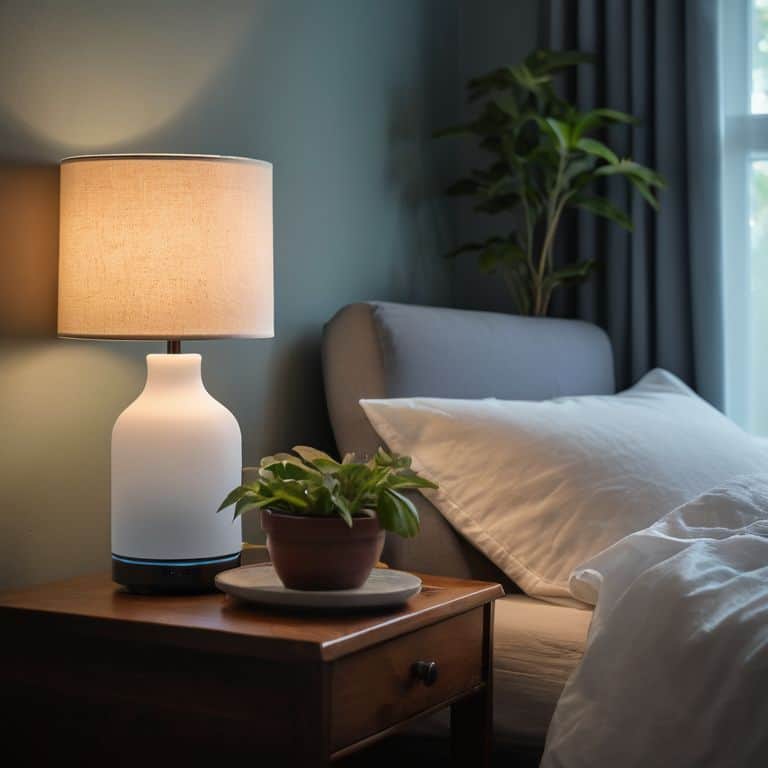As I sit here in my quiet garden, surrounded by the soothing sounds of nature, I’m reminded of the countless nights I’ve lain awake, wondering what to do when you can’t fall asleep. It’s a feeling of frustration and helplessness that I’ve seen many of my clients struggle with over the years. The common advice to “just relax” or “clear your mind” often falls short, leaving us feeling more anxious and awake than ever. I’ve found that the key to a restful night’s sleep lies not in grand gestures, but in small, gentle steps that calm the mind and soothe the body.
In this article, I’ll share with you my personal approach to overcoming sleeplessness, one that emphasizes simple, yet powerful techniques to quiet the mind and relax the body. You’ll learn how to create a sleep-conducive environment, how to calm your mind with gentle breathing exercises, and how to establish a bedtime routine that signals to your body that it’s time to sleep. My goal is to provide you with practical, no-nonsense advice that you can start using tonight, to help you find your way back to a restful and rejuvenating sleep.
Table of Contents
Guide Overview: What You'll Need

Total Time: 15 minutes to several hours
Estimated Cost: $0 – $20
Difficulty Level: Easy
Tools Required
- Journal (for writing down thoughts)
- White noise machine (optional)
Supplies & Materials
- Herbal tea (such as chamomile)
- Essential oils (like lavender for relaxation)
- Comfortable bedding (including pillows and blankets)
Step-by-Step Instructions
- 1. First, let’s start by acknowledging that it’s completely normal to have nights where sleep seems like an elusive dream. When you find yourself lying awake, try to breathe deeply and focus on the sensation of the air moving in and out of your body. This simple act can help calm your mind and slow down your heart rate, making it easier to relax.
- 2. Next, I want you to try a technique called “progressive muscle relaxation.” This involves tensing and then relaxing different muscle groups in your body, starting with your toes and moving up to the top of your head. As you tense each muscle group, hold for a few seconds, and then release, feeling the _tension melt away_. This can help release any physical tension that might be keeping you awake.
- 3. Now, let’s work on quieting your mind. Often, when we can’t sleep, it’s because our minds are racing with thoughts and worries. Try to focus on the present moment, without judgment, and let go of any thoughts about the past or future. You can do this by paying attention to your breath, feeling the sensation of the air moving in and out of your nostrils, and gently bringing your attention back to the present whenever your mind starts to wander.
- 4. If your mind is still racing, try engaging in a calming activity, like listening to soothing music or nature sounds. You could also try _guided imagery_, where you imagine yourself in a peaceful, relaxing environment, such as a quiet beach or a forest glade. Allow yourself to fully immerse in this imaginary world, using all of your senses to create a vivid picture.
- 5. Sometimes, a change of environment can help. If you’ve been lying in bed for more than 20 minutes and are still awake, try getting up and moving to a different room. Make yourself a warm, non-caffeinated drink, like tea or milk, and sit in a comfortable chair, focusing on the sensations in your body. This can help signal to your brain that it’s time to relax, rather than trying to sleep.
- 6. Another technique you can try is “mindful walking.” Get out of bed and take a few slow, deliberate steps around your room, paying attention to the sensation of your feet touching the ground, the movement of your legs, and the rhythm of your breath. This can help calm your mind and relax your body, making it easier to fall asleep when you return to bed. Remember to focus on the _present moment_, letting go of any thoughts or worries.
- 7. Finally, if you’re still struggling to sleep, try writing down your thoughts and concerns in a journal. Sometimes, putting your thoughts and feelings down on paper can help process and release them, making it easier to clear your mind and fall asleep. Be kind to yourself as you write, and try to focus on finding solutions, rather than getting caught up in worries or anxieties.
Finding Peace When You Cant Sleep

As we explore the realm of sleep, it’s essential to recognize that creating a sleep conducive environment is crucial for a restful night. This can be achieved by ensuring your bedroom is dark, quiet, and at a comfortable temperature. I often find that a natural sleep aids for adults, such as a calming essential oil diffuser, can also promote relaxation. By making these small adjustments, you can signal to your mind and body that it’s time to wind down.
In addition to your physical environment, your bedtime routine for better sleep plays a significant role in preparing your mind and body for rest. Engage in activities that bring you calmness, such as reading a book or practicing mindfulness exercises for insomnia. These exercises can help quiet your mind and reduce stress, making it easier to drift off to sleep. Remember, the goal is to create a sense of tranquility, allowing you to let go of the day’s worries.
By incorporating these elements into your evening routine, you’ll be better equipped to manage stress and anxiety, which are often significant barriers to a good night’s sleep. Overcoming stress for sleep requires patience and practice, but the rewards are well worth the effort. As you work to establish a consistent sleep routine, keep in mind that sleep stage duration and quality are just as important as the overall amount of sleep you get. With time and dedication, you can cultivate a deeper understanding of your sleep patterns and make adjustments to improve the quality of your rest.
Crafting a Bedtime Routine for Serenity
As I sit by my Japanese rock garden, watching the sunset, I’m reminded of the importance of a calming pre-sleep routine. Just as the gentle ripples on a pond can soothe the mind, a serene bedtime routine can ease you into a restful night’s sleep. For me, it’s about creating a peaceful atmosphere – dimming the lights, lighting a candle, and taking a few moments to practice gentle stretches or meditation.
By incorporating activities that bring you calmness and joy, you can signal to your mind that it’s time to unwind. Perhaps it’s reading a book, listening to soothing music, or practicing some gentle breathing exercises. Whatever your choice, make it a consistent part of your bedtime routine, allowing yourself to slowly let go of the day’s worries and drift into a peaceful slumber.
Mindful Moments to Calm the Mind
As we explore the quiet hours of the night, I invite you to step into mindful moments that can calm the mind. Just as a gentle stream soothes the landscape, mindfulness can ease our inner turmoil. Take a few deep breaths, feeling the air move in and out of your body, and bring your attention to the present moment.
In these moments, allow yourself to let go of the tension and simply be. Imagine yourself walking alongside a serene lake on a summer morning, with each step, feeling the weight of your worries slowly lifting. As you breathe, repeat a gentle phrase to yourself, such as “I am calm” or “I am at peace,” and let the stillness of the night envelop you.
Gentle Remedies for Restless Nights
- Take a few moments to breathe deeply and slowly, feeling the weight of your body on the bed and the sensation of the air moving in and out of your lungs
- Engage your senses in a calming activity, such as listening to soothing music or nature sounds, or smelling the scent of lavender
- Reflect on your day with kindness and compassion, letting go of any worries or concerns, and reminding yourself that tomorrow is a new opportunity
- Try progressive muscle relaxation, tensing and then relaxing each major muscle group in your body, starting with your toes and moving up to your head
- Get out of bed and take a short, gentle walk in the dark, noticing the sensation of your feet touching the floor and the quietness of the night, before returning to bed with a calm and clear mind
Key Takeaways for a Peaceful Night's Sleep
When you find yourself lying awake, try to focus on the gentle rhythm of your breath, allowing your body to relax and your mind to calm
Establishing a consistent bedtime routine can signal to your brain that it’s time to sleep, helping you to drift off more easily and wake up feeling refreshed
Remember, it’s okay to have nights where sleep seems elusive – the important thing is to approach these moments with kindness and patience, using them as opportunities to practice mindfulness and self-care
A Gentle Reminder
Just as a river flows smoothly when it lets go of the rocks in its path, we too can find sleep when we release the burdens of our minds and allow ourselves to gently drift into the calmness of the night.
Dr. Samuel Cole
Finding Peace in the Still of the Night

As we’ve explored together, those sleepless nights can be a challenging and frustrating experience, but they also offer an opportunity for growth and self-reflection. We’ve discussed the importance of mindful moments to calm the mind, and crafting a bedtime routine that promotes serenity. By incorporating these practices into your daily life, you can begin to transform your relationship with sleep and find peace in the still of the night. Remember, it’s about taking small, gentle steps towards a more restful and fulfilling life.
So, the next time you find yourself lying awake, try to see it as a chance to reconnect with your inner self. Take a few deep breaths, and let the quiet of the night wash over you. As you drift off to sleep, or even if you don’t, know that you’re one step closer to embracing a more peaceful, more compassionate you. And when the morning light creeps in, take a moment to appreciate the beauty of a new day, full of possibilities and promise, waiting for you to unfold.
Frequently Asked Questions
What if I've tried everything and still can't fall asleep, are there any other options left for me?
Don’t worry, my friend, there’s always another path to explore. If you’ve tried various techniques and still struggle, let’s consider seeking guidance from a healthcare professional who can help you identify underlying issues and develop a personalized plan to address them. Sometimes, a fresh perspective is all we need to find our way back to restful sleep.
How can I ensure that my bedtime routine is consistent even on weekends or days off?
Consistency is key, my friend. I recommend setting a regular bedtime and wake-up time, even on weekends. Think of it like a gentle stream flowing smoothly, uninterrupted by external factors. By maintaining a consistent routine, you’ll find your body and mind adjusting, making it easier to fall asleep and wake up feeling refreshed.
Are there any specific mindfulness exercises that can help calm my mind when I wake up in the middle of the night and can't fall back asleep?
When you wake in the night, try a gentle “4-7-8” breathing exercise: breathe in for 4 seconds, hold for 7, and out for 8. This can calm your mind and body, much like a soothing stream smoothing out rocks. As you breathe, imagine any thoughts or worries floating away with each exhale.
